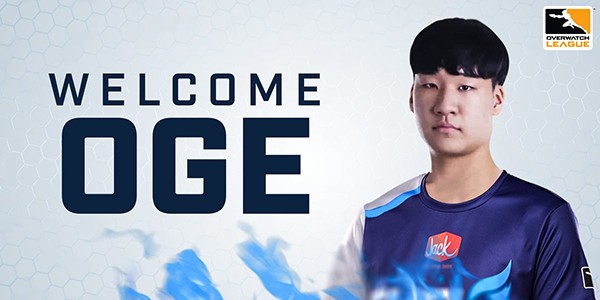RELATED: Korean Overwatch Casters on the OGE Broadcasting Issue: "It was for the Korean fans."
Throughout the history of China, people refrained from mentioning their emperor by his real name. When a new emperor took the throne, and his name contained common Chinese characters, some of those characters were modified to prevent the name from being mentioned. To prevent this from happening as much as possible, children born of royal blood were often given names containing uncommon characters.
'Taboo names' can also be found in western culture, and are usually avoided because they have an unlucky or ominous connotation. The most well-known example is Voldemort from the Harry Potter series.
A recent controversy in the Overwatch League actually involves such a name. The player involved is Dallas Fuel's tank, OGE, who was exposed by the community as an 'account-booster', boosting other accounts for financial gain.

Eventually, the suspicions were confirmed true; and as punishment, OGE was suspended for four matches. However, this spurred additional controversy in the Overwatch community, with the fans suggesting that the punishment was too small. After all, before OGE's suspension, Philadelphia Fusion's SADO was suspended for similar offenses, but Sado's suspension was up to thirty matches. When OGE returned to the stage, the Korean fans didn't welcome him.
The main chunk of the controversy started from OGE's return -- the Korean OWL commentators refrained from mentioning OGE by his name. They either referred to the player by the hero that he was playing or simply called him "Fuel's tank player." And during a break in between the sets, commentator Jung said, "The Dallas Fuel has started showing us an entirely different form since their match with Seoul Dynasty. The tanks played very well -- they enabled the DPS players to do what they needed to do. However, we couldn't mention this in real-time during the game, and to be honest, we didn't want to."
▲ Commentator Jung saying that she doesn't want to mention anything in regards to OGE
Although the behavior of the commentators could've been seen as player discrimination, most of the actual Korean fans watching didn't express any displeasure, and instead seemed to be somewhat pleased with the act. That isn't too unexpected though, as the Korean Overwatch ladder has been suffering from an overabundance of hackers and account-boosters for a long time, even when compared to the other regions.
A large portion of the western audience, however, was bothered by this behavior. Well-known OWL commentator MonteCristo labeled such behavior as "unprofessional" and said that casters who see "a giant ethical problem" with players who boosted previously should simply quit.
▲MonteCristo, criticizing the Korean casters
Following Monte's bold statement, the opinions of the Korean community was torn in half. Some agreed with Monte's opinion that "commentators need to suppress their personal feelings while commentating," while some agreed, but still found Monte's words to be a little too harsh. The other half of the community disagreed with Monte, stating that "the Korean commentators did nothing wrong, especially if you consider the current state of the Korean ladder and the historical mishaps that have happened in Blizzard's esports games." As the controversy grew, Monte acknowledged that his wording was too harsh and apologized through his Twitter, but still upheld his opinion regarding the Korean commentators' behavior.
Objectively speaking, the way the Korean casters refrained from bringing up OGE's name was indeed unprofessional. In traditional sports, there have been many instances where the casters kept themselves from casting the spotlight on players who were punished for drug abuse or gambling, but there have been very few if any instances where casters completely refrained from speaking a player's name. The criticism that such behavior can affect the overall quality of the broadcast also holds true.
However, there are some understandable arguments regarding this issue. When StarCraft 1 grew massively in size, even garnering the attention and sponsorship of large-scale companies, the entire scene was destroyed due to betting sites and match-fixing. Similar events occurred in the StarCraft 2 scene as well, with even coaches and esports employees taking part in the violations. There was also a similar case in the League of Legends esports scene, where a team was found to be running an 'account-boosting workshop' and had attempted to match-fix for a betting site, almost endangering the development of the league.
In a way, the act of breaking the rules for personal financial gain and/or lowering the quality of the ladder experience really stirred the emotions and memories of the Korean veteran casters and fans that have witnessed their favorite games collapse before their very eyes. Some fans also propose that "if the players are willing enough to boost accounts for money, it's definitely possible that they will match-fix, too."
Because of the extremely negative effects of these actions, a law was proposed in Korea last year, one that punished account-boosting with 2 years in prison or a fine of up to $19,000 USD. The very fact that this law was proposed shows just how strongly Koreans feel about this issue.

Fissure, who moved to the LA Gladiators, tweeted “If they know that they’ve caused harm to other Overwatch players, they need to be sorry about that.” Boosting accounts is not only hated by Korean Overwatch fans but the players as well.
In League of Legends, Lee “Chance” Chan-dong was banned from the scene for his actions, but the players in Overwatch still remain, offering excuses like “My family was going through a hard time so I needed the money, but I’m very sorry now.” For other Overwatch players who - despite being in worse situations - still play the game fairly, excuses like that are extremely discouraging.
For example, Architect of the San Francisco Shock, who was living in a poor environment, didn’t fall give in to the temptation to boost accounts, and Kaiser of Optic Gaming, whose struggles caused him to consider giving up his dream of becoming a pro gamer, never resorted to account boosting.

There are many fans who want the games to deliver outstanding performance since the league is just starting, but there are also many fans that want a ‘clean’ league. The players often have fans that look up to them, and people usually prefer it if their idols have good morals. However, it seems like the fans' hopes have been dashed many times, with the league suffering from many issues involving the players' personalities and unsportsmanlike conduct.
In the WWE, there is intentional conflict between ‘dirty’ wrestlers known as Heels, who are often portrayed as villains, and the ‘clean’ players known as Faces like John Cena; the conflicts between these types of wrestlers is one of the big driving forces of the wrestling world. Maybe the Overwatch League will follow suit and emphasize the conflicts between players and their differing morals.
Regardless of what will come, the current situation is not one that the fans are fond of; the players that would be banned for life in other games are instead basking in the spotlight. If the punishments remain as light as they are, players may feel more encouraged to account boost or fix matches going forward. If history has proven anything, it is that these issues can tear an esports scene apart -- and is the biggest reason why Korean players, the biggest player-pool for OWL, feel uncomfortable regarding the issue.
Sort by:
Comments :0







